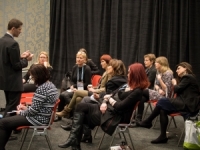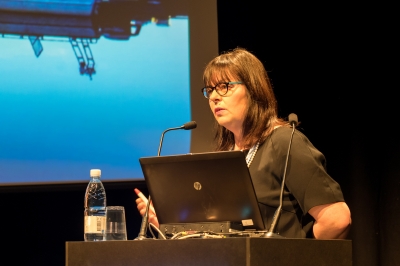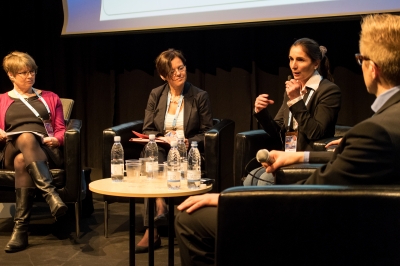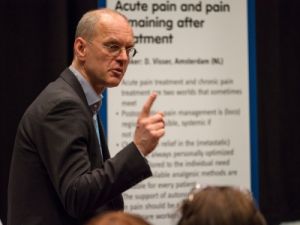Stockholm meeting highlights new trends in nursing care

The 15th International EAUN Meeting in Stockholm ended in gathering a much broader group of allied healthcare professionals, which demonstrated the intrinsic links and benefits of a multi-disciplinary approach to urology care.
Over three days the EAUN delivered a comprehensive, exciting and a demanding programme, featuring workshops, panel discussions, state-of-the-art lectures, symposia, interactive case discussions and poster sessions, attended by over 330 delegates and members of 10 national urological nursing societies.
In his opening remarks, EAU Secretary General Prof. Per-Anders Abrahamsson, who very much set the theme of the congress, reaffirmed the benefits of a multi-professional approach to urology care and highlighted the positive impact of his department’s nurse-led “Botox team” and the importance of multi-disciplinary research.

Kate Fitzpatrick welcoming the delegates
Courses and workshops
The EAUN-ESU courses and workshops, as always, proved popular and delivered up-to-date and focused education on key urological topic areas, including bladder cancer management, urinary tract obstruction, how to close the gap between research and practice, making sense of clinical articles and the Marketplace Session this year examined issues around the topic of pain management.
In the session on neurogenic bladder dysfunction, Stefano Terzoni (IT) provided an in-depth overview of the treatment options offered by nurses and how this work was integrated as part of a multi-professional approach, including behavioural therapy, use of catheters, electrical neuromodulation and stimulation of the pelvic floor muscles. The key take home messages were patient education, and the need for nurses to take charge in order to improve patient outcomes.
The nursing in robotics session very much highlighted the technological advances in urological care, the increasing role played by nurses, and the work of the EAUN with the EAU Robotic Urology Society (ERUS). Interestingly, Assistant Professor Khursid Ghani (US) suggested that “robotic prostatectomy was a dying procedure,” an opinion primarily based on the recent US Preventative Services Task Force statement, which recommended no more PSA screening which led to a lower number of prostate cancer cases being diagnosed in the US and, in turn, resulted to fewer robotic prostatectomies being done. Ghani, however, noted, that in Europe it would take longer for these effects to be seen.
On a positive note, the use of robotics in renal surgery is becoming increasingly popular in managing complex renal stones due to its reconstructive capabilities. Following on from this collaborative organisational approach, our now established EAUN-EONS session focused on the nursing role in new cancer developments and in targeted therapies, advanced nursing practice roles in oncology, and our roles vis-a-vis new surgical techniques and how they have expanded over the last 10 years. It raised important issues about accreditation, educational development and the nature of practice and regulation and, most importantly, underscored the benefit of a nurse-led follow-up.
The workshops on penile and testicular cancers discussed care pathways, epidemiology and oncology treatment approaches and, importantly, how patients were followed up. From the Netherlands, Erik Van Muilekom discussed key quality-of-life issues for penile cancer patients, ongoing research in his unit and some of the functional issues following amputation due to urinary tract changes.
While innovations in practice were very much a key component of the meeting there was also a need to reflect on disease chronicity and the necessity for earlier palliative care intervention in urological cancers. Antonia Lannie (GB) and Louisa Fleure’s (GB) presentations focused on the important social and psychological aspects of cancer care in older people and how needs fluctuate based on “changing disease pathway” new treatment developments and the subsequent uncertainties.

Urology nursing sparked a lively panel discussion
Poster abstract session
The increasing number of abstract submissions led to a broad cross-section of topics for presentation, demonstrating urology nursing expertise and the significant impact of autonomous nursing practice as part of a team approach. Presentations ranged from nurse-led extracorporeal shock wave therapy for chronic pelvic pain syndrome, patient safety and acceptability in men who have undergone radiotherapy following prostatectomy to the incidence of urinary infections associated with the use of long-term bladder catheters.
The clear message was how nurses were improving patient care through integration of evidence-based approaches. New to this year’s programme was the unmoderated poster session allowing presenters not selected for formal presentation to showcase their work. The session was highly successful and will be a permanent feature of the congress. The first prize went to M. Boarin and colleagues with their study titled “Post-operative pain assessment and management in radical prostatectomy: a literature review.”
The nursing research project award went to B.R. Villumsen for the study “Xbox 360 Kinect exercise for men receiving androgen deprivation therapy for prostate cancer,” whose final results I am very much looking forward to. Maybe there is more than meets the eye in playing “Plants versus Zombies, garden warfare”?
Symposium
The theme for the two sponsored sessions very much focused on the changing paradigm of treatment for advanced prostate cancer, the extension and improvement in quality of life afforded by new treatment developments and our greater understanding of disease biology. In both sessions, there was a multi-professional focus which again reinforced the key roles of nurses. Both sessions proved to be very dynamic with a lot of discussion, questions and debate.
Difficult cases
As always, the session on difficult cases proved to be very popular and interactive. This session acknowledges that all nurses encounter problems in daily nursing practice, and while some find their own solutions, others don’t. Thus, this session provides the opportunity to discuss such issues with our peers. An interesting case presented by critical care nurse Donna Pierre (UK) discussed the management of an intensive care patient with Gitelman Syndrome, an autosomal recessive kidney disorder characterised by hypokalemic metabolic alkalosis with hypocalciuria. Other cases included patient care after penile amputation and meeting the nursing needs of the complex cystectomised patient.

Dick Visser (NL) discussing acute pain
Hospital visit
Congress participants were also given a unique chance to visit the host hospital and look at urology care. This year participants visited the Södersjukhuset (Stockholm South General Hospital) which has the largest Emergency Care Unit in the Nordic region. They were met by Prof. Ulf Norming, head of the Urology Department. The urological clinic primarily cares for patients suffering from one of the urological tumour-related diseases, non-malignant enlargement of the prostate or stones in the urinary tract.
Video abstract session
Following the success last year of the video abstract session in Milan, ”Inside the Body-Surgery in Motion,” drew positive feedback from the participants who found this session very informative and interesting. This year we were delighted to have Sandra Morton from the European Operating Room Nurses Association (EORNA), an organisation which represents the influential voice of perioperative nurses in Europe. Morton jointly chaired the session, highlighting the role diversity amongst our members and the importance of linking and collaborating with important nursing organisations.
Madrid meeting
The 16th International EAUN meeting in 2015 will be held in Madrid from March 21 to 23 next year. The deadline for abstracts, difficult cases and nursing research project plans will again be on December 1, 2014. For details, check the updates at the congress website at www.eaumadrid2015.org/eaun. We look forward to your submissions!

